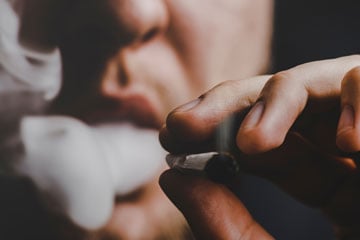
The executive director of B.C.'s Lawyers Assistance Program says that with the decriminalization of marijuana, lawyers who are abusers are now more open to talking about their problem and seeking counselling.

The executive director of B.C.'s Lawyers Assistance Program says that with the decriminalization of marijuana, lawyers who are abusers are now more open to talking about their problem and seeking counselling.
"I have noticed in the past six months more are lawyers willing to talk about their marijuana use, now it is considered more or less legal, than they have in the past 10 years," says Derek LaCroix, adding he doesn't believe the numbers reflect a spike in use but a hidden problem.
LaCroix said lawyers have talked about their alcohol abuse, but drugs are another story. He points to a U.S. survey two years ago of 15,000 lawyers, which saw 11,500 respond to questions relating to alcohol and depressants. However, of the survey size, only 3,000 answered questions related to illegal drug use although the survey was designed to make responses anonymous.
"Lawyers have always held their drug use fairly close to their chest," LaCroix says.
The decriminalization of marijuana will help those in need of counselling come forward for treatment.
"That is very positive — a good side," says LaCroix, who favours decriminalization even though he does not support marijuana use. "The more you criminalize it, the more you drive it underground."
Still, alcohol abuse remains the leading substance abuse problem in the legal profession, he says.
A University of Victoria study released recently concurs, attributing 70 per cent of the $38.4 billion cost to society of dealing with substance use and abuse to alcohol and tobacco. Opioids are ranked a distant third, although the study stated the most rapid rise in costs were related to alcohol, opioids and cannabis. As of 2014, the cost of dealing with cannabis related issues was $2.8 billion.
The Canadian Substance Use Costs and Harms study, produced by the university's Canadian Institute for Substance Use Research and the Canadian Centre on Substance Use and Addiction, looked at costs associated with health care, lost production, criminal justice and other direct costs between 2007 and 2014. It covered a broad spectrum of substances including alcohol, tobacco, cannabis, opioids and central nervous system depressants, cocaine and CNS stimulants, and other substances such as hallucinogens and inhalants.
Of the $38.4 billion cost, the report allocated $9 billion to the criminal justice system or 23 per cent. The largest cost was assigned to lost productivity estimated at $15.7 billion or 41 per cent of the total, while healthcare costs were $11.1 billion or 29 percent of the total. The remainder was attributed to other direct costs.
It is not all about costs, although with provincial licensing of outlets, some profits will flow to governments rather than organized crime, says Tony Paisana, B.C. criminal lawyer with Peck and Company as well as the chair of the Canadian Bar Associations Law Reform Committee.
"There are unresolved questions," he says, as various parts of Canada applied differing legal approaches to marijuana use, distribution, and sales.
"There was a need for government to respond — we couldn't keep going on with the status quo. It is still unclear but now we have a legal framework to operate in and litigate and figure out the answers," he says of the new act.
Paisana says that every new piece of legislation goes through a process of determining how it is enforced with court test cases. He expects the Cannabis Act will be no different. "Within every new regime, there will be growing pains," he says.
Past policing practices may no longer suffice. "I am curious as to what effect it will have on police justifying (motorist) stops," he says as officers have used the excuse in court of smelling marijuana as a precursor to arresting drivers or finding drugs. "Now that is legal, what happens to that justification?"
Paisana says there will also be a period when provinces decide where they will place the emphasis on enforcement as provincial legislation changes and the federal statute is enacted. In B.C., he says, there is a focus on police training occurring in regards to drug-impaired driving. (Currently, Acumen Law is challenging the use of the federally-approved Dräger DrugTest 5000, now being issued to police to test saliva, claiming its' research has shown an error rate of up to 15 per cent in readings).
Vancouver criminal lawyer David Karp says one of the ironies is that legalization will initially place more of these issues regarding marijuana use before the courts. Whether that translates into new business for criminal lawyers still remains an uncertainty, Karp says, but he agrees that legislation was needed.
"There were a lot of grey areas," he says, adding that police were using discretionary powers rather than charges to deal with marijuana infractions. Five years ago, he says, he handled up to 17 cases per month involving illegal grow operations, but today they are few in numbers. "They are not charging individuals with marijuana grow ops — just dismantling and destroying it (marijuana)," he says.
But, with new laws and licensing, that could change.
"There is some clarity in the law now and the courts will give rulings," he says.